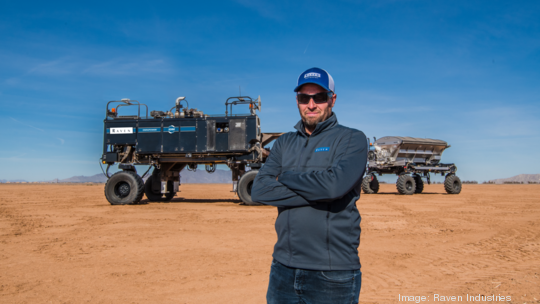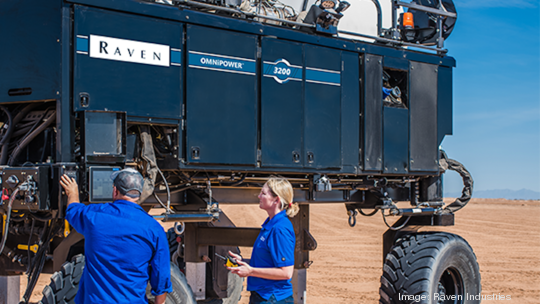
Arizona streets are crawling with autonomous vehicles, and one South Dakota company is bringing AVs out to the farm.
Sioux Falls-based Raven Industries recently opened a new office in Scottsdale to support its two AV test sites south of town in Maricopa and Casa Grande. The Scottsdale office (currently occupying 15,000 square feet at SkySong) is home to engineers focused on machine learning, artificial intelligence and computer vision.
Raven makes kits that mount on standard tractors and turns them into autonomous vehicles that can till, spray and harvest farmland. These kits are out on the market today, and the company is also developing a standalone vehicle, called the Omnipower 3200, that does not have a cab for a driver to occupy (see photo above).
Kavita Vir, Raven’s director of technology, growth and retention, said deploying AVs on farms makes operations more efficient and helps fill a labor gap.
“Doing more with less is actually a fundamental mantra of farming today,” she said. “It enables our operations to accomplish a lot more than people with manual labor, right? More full coverage, but less labor. And it's very, very difficult to find skilled labor, especially if you look at us in Covid times.”
AVs also offer more precision and reliability; The machines are more exacting with their application of pesticides, their routes are designed for peak fuel efficiency and they don’t get bored the way a human does after snaking up and down a field for hours on end.
There are currently 14 people on Raven’s Scottsdale team, but the company expects to grow up to 60 or 80 in the next year.
Phoenix metro's talent pool attracted company
Philip Corio, senior director of engineering at Raven, said the company has engineers at its South Dakota head office, but it needed access to a bigger talent pool.
“We looked at a bunch of different areas for geographic expansion, Scottsdale came up very, very high on the top of the Phoenix metro area, because of the access to talent pool,” he said. “The additional factor was, we've been testing in Arizona during the winter for several years now, we always end up there in winter anyway.”
The engineers in the Scottsdale office will help improve Raven's tech and develop it to take on new tasks; Covio said each operation requires its own unique software solution, for example getting the tractor to run a sprayer is much less complicated than a tilling operation which must factor in speed, tiller depth and how to handle equipment blockages.
Corio said Raven equipment is deployed at farms of all sizes, from smaller single growers up to large corporate customers with big fleets, but he said it really only makes sense to run Raven AV gear on operations with 500 acres or more.

Raven was previously a public company, generating net sales of $348 million in 2021, but it was acquired by U.K.-based CNH Industrial (NYSE: CNHI) in September. CNH is one of the largest agriculture equipment makers in the world and it paid $2.1 billion to buy Raven.
Before the acquisition Raven was making only the aftermarket kits to augment tractors and it will continue to do so. But now, as part of CNH, this autonomous tech is expected to be available on CNH vehicles in the future.
“That's gonna be a great experience for the buyer, if they can go into their CNH dealership, see the machine that they like and say, ‘Oh, by the way, I'd like that factory option for the autonomy,’ that would be kind of awesome,” Corio said. “That's what we're kind of shooting for the next few years.”
Farming has long been a part of Arizona’s economy, but drought is forcing change. Arizona’s agriculture sector is by far the biggest water user in the state — making up for more than 70% of usage annually — so water cuts are impacting farmers first.










